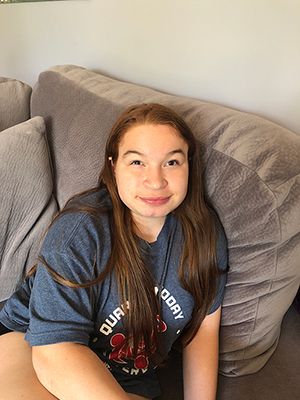Anisa: assessed early, flourishing today
If you spend time with Anisa, you will laugh. She’s got a wicked sense of humour, and a performer’s instincts. She’s also a dancer, a video editor, and a French immersion student – while living with a rare genetic syndrome that can cause serious neurological impairment.
A big reason for Anisa’s flourishing is her treatment at SickKids, and, specifically, the neuropsychological assessments she’s received regularly since she was a baby.

Anisa’s condition is Mucopolysaccharidosis type I (MPS-1), and it’s extremely rare. Medically speaking, a gene mutation leads to an enzyme deficiency, with negative effects on a patient’s cells; what MPS-1 means in their lives is skeletal, organ, and cognitive effects that are often severe.
“We didn’t treat her as a child with a scary, progressive disease. We treated her as a happy, healthy individual who happened to have MPS-1.”
Anisa was diagnosed just after she turned one. Jennifer, Anisa’s mom, remembers feeling, literally, “Terror. We had no idea of a pathway.” Anisa had already been treated for a club foot, and hip problems, so Jennifer was aware of MPS-1’s physical challenges. Its cognitive challenges, and their effect on mental health, worried her more.
Anisa and Jennifer needed a path forward. They found it, in the form of SickKids paediatric neuropsychologist Dr. Eva Mamak.
For kids like Anisa, early intervention is key. SickKids uses in-depth assessments – measuring memory, learning, intelligence and attention – before major treatment decisions.
Jennifer still speaks with admiration about Dr. Mamak’s approach: “She figured out how to do a neursopsych test over two days on a still-nursing baby.” The testing involved motor skills, pointing to pictures – engaging her in specific, ‘medical’ play – to estimate Anisa’s cognitive development. “I was putting a lot of trust in this lady. The testing was going to decide Anisa’s treatment.”
Jennifer’s trust was repaid. Dr. Mamak determined that Anisa was doing very well cognitively. “With Eva’s extreme caution, we decided that Anisa could move forward with just enzyme replacement therapy,” says Jennifer. (Kids with more severe MPS-1 are often treated with a bone marrow transplant (BMT), which can have more risks.)
Dr. Mamak has continued to assess Anisa since, at key transition points like hitting high school, which is a time with increased risks for mental health issues. But what meant more to Jennifer then, and to Anisa today, were the words Dr. Mamak gave them: “She is smart, she is well, she is brave, and she is intact. Go forward and cram all the knowledge you can into this kid.”
Through 16 surgeries, 26 admissions to SickKids, 8 years of weekly enzyme replacement therapy in hospital (they now do it at home), and her ongoing neuropsychology check-ins, that’s what they’ve done.
Says Jen, “We did not treat her as if she were a child with a scary, progressive disease. We treated her as a normal, happy, healthy individual who happened to have MPS-1. When this kid doesn’t clean her room, there’s consequences.”
At this, Anisa, in typical teenage fashion, rolls her eyes and laughs.


